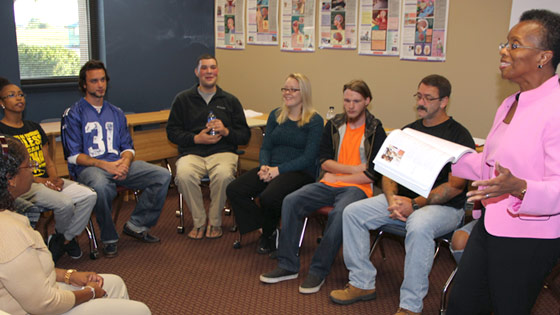
Explore Academic Programs - Mental Health Services and Social Work
The CTC Human Services Program offers associate degrees in chemical dependency, at-risk youth and social work specializations; and a certificate of completion in community health work. All programs can be completed online affording students an opportunity to further their education in the midst of busy lives or in the classroom. Faculty are not only credentialed academically to teach but, to date, bring 75 years of field experience to the program.
Students completing either program of study find work in agencies that provide chemical dependency counseling or in the juvenile justice system, residential treatment settings, community based after-school programs and in the public school system as teachers’ aides. Completion of the social work specialization may be transferable to a four-year school, however, students may still find work in the service areas mentioned above.
Know Your Path? CTC Pathway
[Pathways are structured academic plans designed to guide students through their education. They outline the courses, support services, and skills needed to achieve specific career goals or complete a particular program of study. Pathways help students stay on track, ensuring they take the right courses in the right order and receive the support they need to succeed.]
Degrees and Certificates
This program offers different pathways, and you can choose your final destination. Students may pursue an associate degree or certificates. The certificates allow more immediate employability with specialized courses. The associate degree adds additional specialized coursework along with more general academic courses. Degree and certificate programs at CTC are designed for students who wish to enter the field or professionals and add additional credentials or education for professional development.
| Degrees & Certificates | Delivery Mode |
|---|---|
| At-Risk Youth Specialization (AAS) 60 credit hours, two years full time |
Central Campus Day Online Other US Locations (Fort Polk) |
| Chemical Dependency Specialization (AAS) 60 credit hours, two years full time |
Central Campus Day Online Other US Locations (Fort Polk) |
| Social Work Specialization (AAS) 60 credit hours, two years full time |
Central Campus Day Online Other U.S. locations (Fort Polk, Fort Stewart, Hunter AAF) |
| At-Risk Youth Advanced Certificate (CC) 45 credit hours, four semesters full time |
Central Campus Day Online |
| Criminal Justice Addictions (CC) 47 credit hours, four semesters full time |
Central Campus Day Online |
| Basic Mental Health Professional (CC) 20 credit hours, two semesters, full or part time |
Central Campus Day Online |
| Chemical Dependency Counseling (CC) 47 credit hours, four semesters full time |
Central Campus Day Online |
| Community Health Worker (CC) 18 credit hours |
Central Campus Day Online |
| Substance Abuse Prevention Specialist (CC) 36 credit hours, three semesters full time |
Central Campus Day Online |
| Course Descriptions | |
| CHLT | PSYT |
| CMSW | SCWK |
| DAAC | SOCW |
Transfer Agreements
Central Texas College offers 2 Plus 2 transfer agreements with four-year schools. This allows students to start at CTC and smoothly transfer to a bachelor’s program, with all courses counting toward their degree.
Transferring from Central Texas College to a four-year college or university is a popular path to a bachelor's degree.
Careers, Potential Earnings & Market Growth Rates
Youth specialist
Potential Earnings: $19-25,000 annually
Market Growth Rate: average (11%)
Chemical dependency counselor
Potential Earnings: $46,240 annually
Market Growth Rate: Much faster than average (22%)
Social work/human services assistant
Potential Earnings: $18-30,000 annually
Market Growth Rate: average (6%)
Licensed social worker **
Potential Earnings: ** $50,470 annually
Market Growth Rate: ** much faster than average (14% or higher)
Community Health Worker
Potential Earnings: $40,360 annually
Market Growth Rate: much faster than average (14% or higher)

